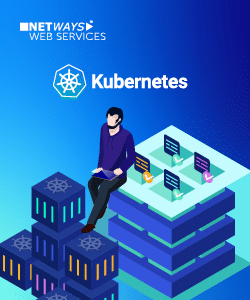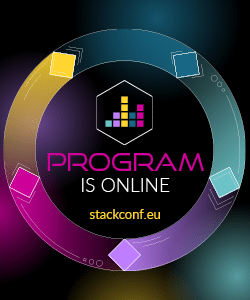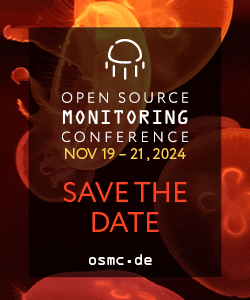Bis zum Startschuss zur OSMC 2012 am 17. Oktober wollen wir allen Ungeduldigen und Neugierigen die Wartezeit ein wenig verkürzen. Dafür gibt es ab heute eine neue Blogserie, in der wir jeden Montag einen Referenten der OSMC 2011 zu Wort kommen lassen.
Den Anfang macht Christoph Siess mit seinem Vortrag „Performance-Vergleich von Nagios Monitoring Lösungen“
//www.youtube.com/watch?v=c38R0SPieFY
NETWAYS Blog
MC 2011 impressions, DNC, Check WMI Plus & Python for UAC Tips
 28 Nov – 2 Dec reported from the OSMC while offering tips for windows monitoring without NSClient++, keeping an eye on DNS server activity and a Python solution to a Windows Vista UAC bug.
28 Nov – 2 Dec reported from the OSMC while offering tips for windows monitoring without NSClient++, keeping an eye on DNS server activity and a Python solution to a Windows Vista UAC bug.
To begin, Birger saw the OSMC 2011 kick off, with an opening speech by Bernd where our new performance grapher, InGraph was also introduced. He then went off to Christoph Siess’ presentation, which gave a “Performance Comparison of Nagios Monitoring Solutions” (read Nagios, Icinga, Shinken, mod_gearman, Merlin). In short, he noted latency dramatically increases in Nagios 3.2.1 once a certain number of checks is exceeded. Nagios with mod_gearman and Shinken perform significantly better, while latency in Nagios, Icinga and Merlin were similar.
Ronny followed with a tool for statistical analysis of DNS servers. The DSC (DNS Statistics Collector) runs a collector on the server to record traffic flows in the form of a XML file every 60 seconds. This file is then converted by a presenter component for display in a CGI web interface. More information is available on the developer’s homepage.
Bernd then offered his impressions of the second OSMC day. After a big night atop the Nuremberg Christmas Market, almost all attendees made it to the conference rooms for two tracks of presentations on Nagios, Icinga with their related plugins and addons.
In between, Carsten offered an alternative to NSClient++ for windows monitoring – check_wmi_plus. As a plugin, check_wmi_plus offers agentless monitoring of a similar standard, implementing checks with performance data too. He noted that installation requires the WMI client for Linux, and gave some tips for configuring users and service monitoring in the command line with SubInACL. Documentation with more on useful checks is also within reach.
Also, Johannes shared a Python module for Windows Vista’s UAC, which he ported based on a suggested solution made by Aaron Margosis in his blog. Humbler.py resolves a problem similar to the LUA bug, where the user settings are at odds with the registered user.
Finally Pamela bid the OSMC 2011 farewell, thanking all participants, supporters and the Holiday Inn hotel for their contributions to a great event. She shared Jens-Christopf Brendel’s review in Admin Magazin and has since been busy filling the attendee area of the OSMC website with photos and presentation slides from the conference. The date for the next OSMC has been set for 17 – 18 October 2012, but before then, we hope to see you at our next event – the Open Source Data Center Conference on 25 – 26 April!
OSMC2011 Eröffnung
Die diesjährige Open Source Monitoring Conference ist eröffnet. Bernd hat die Teilnehmer auf die kommenden Vorträge und die Abendveranstaltung eingestimmt und die Gelegenheit der Eröffnungsrede genutzt um kurz InGraph vorzustellen.
Die Vorträge laufen wie immer parallel in zwei Sälen. Den ersten Vortrag im größeren der beiden, „Performance-Vergleich von Nagios Monitoring Lösungen“ von Christoph Siess habe ich mir angehört.
Es werden die aktuellen Monitoringlösungen/Komponenten mit Nagiosbezug (Nagios, Icinga, Shinken, mod_gearman, Merlin) im Hinblick auf ihre Performance und Skalierbarkeit verglichen.
Ausgeklammert wurden der embedded Perl Interpreter, und Performance Daten.
Die Ergebnisse sind sehr interessant:
– beim Nagios 3.2.1 steigt die Latenz ab einer bestimmten Zahl von Checks sprunghaft an. Die Dauer der Checks wirkt sich merklich auf die Latenz aus. Störungen (also nicht OK Checks) wirken auch negativ auf die Latenz. (Latenz bei 2200 checks 7s)
– im Vergleich dazu Nagios mit mod_gearman (Latenz 0.5s)
– Shinken (Latenz 0.9s)
– Icinga, Nagios und Merlin verhalten sich nahezu identisch.
– Merlin profitiert von weiteren Nodes zur Lastverteilung.
– mod_gearman profitiert von Worker Prozessen die die Checks ausführen
Leider bleiben einige Fragen offen.
– Wie wirkt sich das anhängen der NDO bzw. IDO aus?
– Welche Wirkung haben Performance Daten?
Wir freuen uns auf zwei spannende Tage hier in Nürnberg
Weekly Snap: OSMC last tickets, JSHint & Graphic Design Job
 31 Oct – 4 November turned over a new month with a tool to ensure javascript code quality, a job opening for a graphic design student and a case of disappearing OSMC tickets.
31 Oct – 4 November turned over a new month with a tool to ensure javascript code quality, a job opening for a graphic design student and a case of disappearing OSMC tickets.
Amidst preparations, Pamela warned that tickets to the OSMC are selling out fast. With just 3 weeks to go, this year’s Open Source Monitoring Conference on 29 – 30 November has already filled all places to the intensive workshops on the conference eve. A few GOLD conference packages are available, but register quick as available rooms at the conference hotel, Holiday Inn are vanishing fast. As in previous years, Thomas Krenn will support the OSMC with a hardware exhibition and as a first, the evening dinner and drinks will be held at Alex – atop Nuremberg’s renowned Christmas market.
Pamela then continued to call out for a graphic design student, interested in part time work to produce print and web material, available for an immediate start. Visit the ‘Jobs’ area of our website for more information and to apply.
Lastly, Eric shared his tip to ensure code quality in javascript with JSHint. Equipped with a javascript implementation such as Rhino, JSHint can be used off as well as online. When both are extracted to a folder, code validation can begin. Using an example bit of code with two common mistakes that bring IE7 to its knees, Eric offered a script to automatically insert missing semicolons and remove excess commas. The rest he leaves to you!
Weekly Snap: Introducing ZeroMQ, Alfresco Community, the OSMC Program & Flexible Downtime
 12 – 16 September discussed document management systems, flexible downtimes, and introduced a distributed computing tool as well as the program to the upcoming OSMC.
12 – 16 September discussed document management systems, flexible downtimes, and introduced a distributed computing tool as well as the program to the upcoming OSMC.
Gunnar took a look at distributed computing using ZeroMQ. A C++ library with various messaging functions, ZeroMQ is usesful in scaling applications, by distributing it over multiple systems. One central component breaks down large tasks into smaller component tasks and transmits them to worker processes. It also compiles the results of the worker processes to form a whole again. In contrast to traditional multi-thread applications, no locks are needed as the individual worker processes have no common condition and they can be distributed across machines, making it scalable without bounds. Gunnar gave an example implementation and some tips to avoid common problems such as work units sizes and operating system independent message formats.
From our Managed Services team, Georg trialled document management systems and named Alfresco Community as his top pick. Between Microsoft Sharepoint 2010’s easy installation yet cluttered feature and settings, and Agorum Core Pro’s complicated installation, Alfresco Community won hands down. With easy installation and a good range of features; Alfresco can also be linked to an Active Directory server for larger organisations.
Lennart then explained flexible downtimes. As opposed to fixed downtimes, the start of a flexible downtime begins at the point a host or service changes status. Taking a host in Icinga for example, the start time and end time can be chosen to have a minimum duration of 10 minutes. Within this time frame the host will be restarted, but taking into account the reboot duration, downtime could extend over the 10 minutes set.
Last but not least, Pamela announced the Open Source Monitoring Conference 2011 program. Two tracks of presentations over two days in English and German, should offer plenty for attendees to chat about. For those who want to pack in more, 3 intensive workshops on the conference eve are also on offer. But register quick, as Europe’s leading event on open source monitoring has been known to sell out.
















